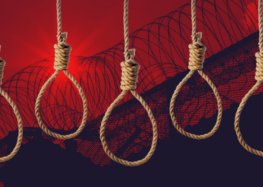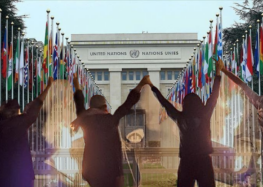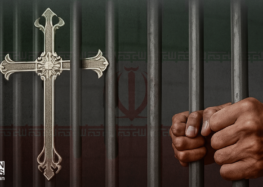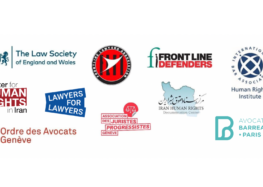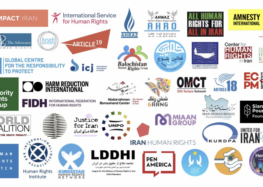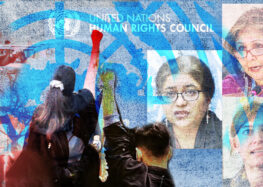Under scrutiny, Iran Shows Increased, but Limited Cooperation with UN Mechanism
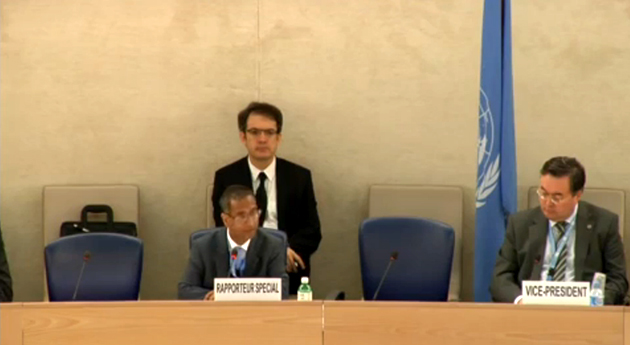
Four years into his mandate as the UN Special Rapporteur on the situation of human rights in the Islamic Republic of Iran, Dr. Ahmed Shaheed told UN member states at a meeting of the Human Rights Council today in Geneva that although he has yet to be let into the country for a site visit, Iran is demonstrating other signs of cooperation with the mandate.
Dr. Shaheed’s remarks came during the presentation of his latest report on the human rights situation in Iran to the UN Human Rights Council, in which he documented, among other issues, Iran’s rising rate of executions, imprisonment of human rights defenders and increasing restrictions on women’s rights.
Dr. Shaheed opened the session by stressing his concerns on a range of issues, including the continued detention of Green Movement leaders Mir Hossein Mousavi and Mehdi Karroubi, the introduction of parliamentary legislation that would restrict women’s education and employment opportunities and execution numbers for 2014 that are reportedly the highest they have been in 12 years.
He noted, with approval, Iran’s recent engagement with some UN mechanisms, such as the Universal Periodic Review and the Committee on the Rights of the Child, but stressed that this was all the more reason for the Human Rights Council to remain “steadfast” in its support of the mandate, as further cooperation with UN mechanisms would only help to “promote incremental steps that may strengthen its steps towards rights protections.”
Iran’s Geneva-based ambassador to the UN, in response, launched a defense in support of his state’s policies, including as it concerns the application of the death penalty to drug-related offenses.
Notably however this year’s approach marked a shift from prior years in that instead of simply directing ad hominem attacks on Dr. Shaheed, the Iranian representative attempted to engage more substantively on the merits by citing to Iran’s increased cooperation with UN human rights mechanisms, including meetings with Dr. Shaheed in locations outside of Iran, and providing a more qualitative assessment of the claims contained in Dr. Shaheed’s report.
The shift in Iranian attitudes follows the evaluation of its human rights record at the second cycle of the Universal Periodic Review in October and November 2014, which saw a total of 104 UN member states present some 291 recommendations urging human rights reforms.
While UN member states opposed to country-specific mechanisms have long pointed to the UPR process as the preferred vehicle whereby Iran’s human rights record should be assessed, out of the 123 recommendations from UN member states that Iran accepted at the first cycle in 2010, it has made partial progress on only 27 of 113 of these recommendations, with not enough data to evaluate the remaining ten.
A possible thaw in Iran’s relationship with the special mandate holder was further reflected in Dr. Shaheed’s closing remarks as he thanked Iran’s Ambassador and his delegates in Geneva for meeting him during the Human Rights Council, as well as officials from Tehran who came for the session, to discuss their perspectives on a number of issues raised in his reporting.
Nonetheless Dr. Shaheed stressed that despite these small yet positive developments in his relationship with Iran in his role as mandate holder, “full cooperation” with the mandate “would mean a country visit”.
He further added that “full cooperation means that there have been no reprisals against human rights defenders, that there are no reprisals against those who communicate information to me.”
In calling on the Iranian authorities to fully comply with their UN obligations and the Human Rights Council to endorse the renewal of the mandate, Dr. Shaheed noted that in light of articles 1, 55 and 56 of the UN Charter, cooperation is not “an option” for states on human rights issues but rather “it is something that they have already pledged to carry forward.”
In respect to the constructive role of the mandate, Dr. Shaheed further observed that this year’s interactive dialogue was the longest he ever held on Iran at the Human Rights Council. He said the long duration time “is evidence that countries are interested in what’s happening in Iran, that many are willing to listen to what the government of Iran has to say about what they can do and believe the government of President Rouhani can make a difference in the human rights situation in the country.”
He also emphasized that “there are specific advantages a country mandate holder holds over other mechanisms” in that the special procedure “enables the country concerned to address issues constantly, not as [a] fleeting engagement, once every four years at a treaty body or at the UPR.”

